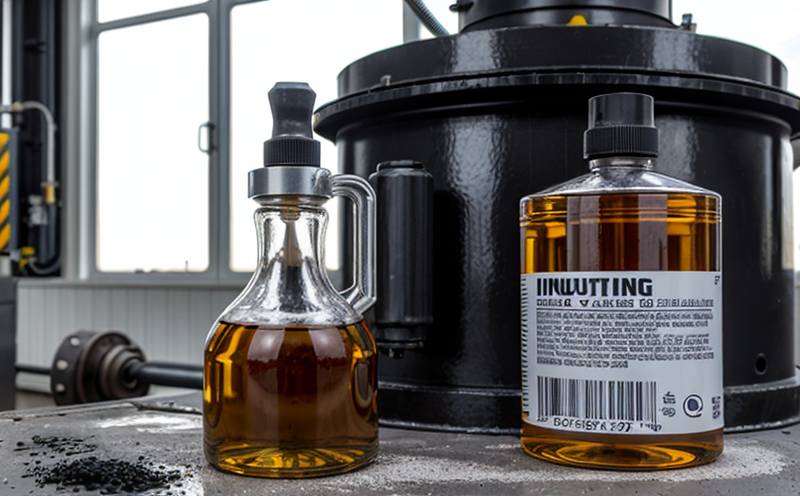EN ISO 3675 Density Testing of Oils
The CEN standard EN ISO 3675 specifies the method for determining the apparent density and relative density of petroleum products at a specific temperature. This test is crucial in the chemical testing sector, particularly for industrial oils and additives, as it helps ensure product quality compliance with international standards.
Industrial oils play a vital role in lubrication, heat transfer, and hydraulic systems across various industries. The physical properties of these oils, including density, are critical to their performance. Density is influenced by factors such as temperature, viscosity, and chemical composition. By accurately measuring density at specified temperatures, the ISO standard helps maintain consistency in product quality.
The test method outlined in EN ISO 3675 involves filling a specific gravity bottle with the sample oil, ensuring no air bubbles are present. The bottle is then weighed and the volume of the sample is measured at a precise temperature using a calibrated thermometer. The apparent density (ρapp) can be calculated using the formula:
\[ \rho_{\text{app}} = \frac{\text{mass of oil in bottle} - \text{mass of empty bottle}}{\text{volume of sample}} \]
The relative density (ρrel) is then calculated by comparing the apparent density to that of water at the same temperature:
\[ \rho_{\text{rel}} = \frac{\rho_{\text{app}}(\text{sample})}{\rho_{\text{water}}} \]
Accurate measurement is essential, as even small deviations in density can affect the performance of industrial oils. For instance, if an oil’s density is too low, it may not provide sufficient lubrication or thermal conductivity. Conversely, a higher-than-expected density could indicate contamination or formulation issues.
The standard also provides guidelines for handling and preparing samples to ensure accurate results. This includes ensuring the sample is representative of the batch being tested, as well as controlling environmental factors such as temperature and humidity. Proper sample preparation and handling are critical steps that can significantly influence test outcomes.
Understanding the importance of density in industrial oils allows quality managers and compliance officers to make informed decisions regarding product formulations and process controls. R&D engineers benefit from this knowledge when developing new products or optimizing existing ones, while procurement professionals ensure they receive high-quality materials by verifying compliance with these standards.
Scope and Methodology
| Key Elements | Description |
|---|---|
| Density Measurement | The method involves filling a specific gravity bottle with the sample oil, ensuring no air bubbles are present. The bottle is weighed and the volume of the sample measured at a precise temperature. |
| Temperature Control | Temperatures must be controlled to within ±0.1 °C to ensure accurate measurements. This can be achieved using an environmental chamber or a thermostatically-controlled water bath. |
| Safety Precautions | The testing area should be well-ventilated, and proper PPE should be worn when handling potentially hazardous samples. |
The standard provides detailed instructions for preparing the specific gravity bottle. It is essential to ensure that the bottle is clean and free from any residues before use. The sample must also be at the correct temperature to avoid errors in measurement. After filling the bottle, it should be placed on a sensitive balance capable of measuring to within ±0.1 mg.
The volume of the oil can be measured using a calibrated thermometer or by submerging the bottle in a thermostatically-controlled water bath and recording the displacement. Once all measurements are taken, the apparent density is calculated using the formula mentioned earlier. The relative density is then determined by comparing this value to that of water at the same temperature.
The accuracy of these measurements can be further enhanced by conducting replicate tests on the same sample. This helps identify any inconsistencies or errors in the process and ensures reliable results.
Customer Impact and Satisfaction
Customers, including quality managers, compliance officers, R&D engineers, and procurement professionals, benefit significantly from EN ISO 3675 density testing. Accurate measurement of oil density helps maintain product consistency, ensuring that the oils meet the required specifications.
For quality managers, this test provides critical data to ensure that production processes are consistent and that any deviations can be quickly identified and addressed. Compliance officers can use these results to verify that products meet regulatory requirements, thereby reducing the risk of non-compliance penalties.
R&D engineers rely on density measurements when developing new products or improving existing ones. By understanding how changes in formulation affect oil density, they can optimize performance characteristics such as viscosity and thermal conductivity.
For procurement professionals, accurate density testing ensures that they receive high-quality materials from reliable suppliers. This reduces the risk of receiving substandard goods and helps maintain a consistent supply chain.
The reliability and accuracy of EN ISO 3675 density testing contribute to overall customer satisfaction by ensuring that products meet expected quality standards. This, in turn, builds trust between customers and service providers, fostering long-term relationships based on mutual respect and shared goals.
International Acceptance and Recognition
- CEN/ISO Members: The standard is widely recognized by members of the European Committee for Standardization (CEN) and the International Organization for Standardization (ISO), ensuring broad acceptance across Europe and globally.
- Regulatory Compliance: Many countries adopt or reference this standard in their national regulations, making it a de facto global benchmark.
- Industry Adoption: Leading industries such as automotive, aerospace, and manufacturing incorporate EN ISO 3675 into their quality management systems to ensure consistent product performance.
- Auditors: Compliance with this standard is often required during audits by regulatory bodies and third-party certification organizations.
The widespread adoption of EN ISO 3675 underscores its importance in the chemical testing sector. Its rigorous methodology ensures accurate, repeatable results that are trusted worldwide. This global recognition enhances customer confidence and facilitates international trade in industrial oils and additives.





